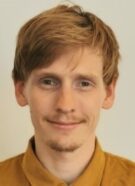Lukas BÖGGE
Chercheur associé
2019 – 2023: PhD candidate in Cognitive Neuroscience, Université Paris Cité
2018 – 2019: M2 in Bioengineering and Innovation in Neuroscience, Université Paris Descartes & ParisTech
2017 – 2018: M1 in Biomedical Engineering, Université Paris Descartes & ParisTech
2012 – 2017: Mechanical Engineering, Technical University of Dortmund, Germany
2014 – 2015: Studies abroad in Mechanical Engineering and Psychology, Northern Arizona
University, USA
2013: 6-month qualification training to become a student business consultant, VIA
Studentische Unternehmensberatung e.V., Dortmund, Germany
Research experience
2019: Virtual reality biofeedback and cognition, LMC², Paris Descartes
2018: Autophagy and endocytosis in stress- induced cells, Institut Necker Enfants Malades
2018: Auditory coding schemes, Laboratoire Psychologie de la Perception, Paris Descartes
2016 – 2017: R&D and prototyping of special machinery, Robert Bosch GmbH, Germany
Profil académique & recherche
Enseignements
Service d’enseignement de
- ANP – Anglais
Thèmes de recherche
- psychophysiology,
- cyberpsychology,
- heart rate variability biofeedback,
- virtual reality,
- cognitive control,
- memory,
- self-reference effect,
- mental time travel
Projets, recherches en cours
- BIOTRAC (Biofeedback Training & Cognition)
The BIOTRAC study series, which constitutes my doctoral thesis, investigates the impact of virtual reality coupled heart rate variability biofeedback on mental processes such as memory, cognitive control, and future thinking. Heart rate variability biofeedback is a self-regulation technique eliciting changes in the autonomous nervous system which may enhance physiological and cognitive functioning. Moreover, we use biofeedback to explore the psychophysiological relationship between cognitive processes and autonomous nervous system activity. In total, the project is comprised of three experiments:
- BIOTRAC-1 – Persistent effects and self-referential memory
Tests the beneficial effects of heart rate variability biofeedback on cognitive control and self-referential episodic memory that are sustained one week after the training period.
-
BIOTRAC-2 – Cognitive control over memory
Examines the possibility to alter autonomic and cognitive functioning during memory processing following heart rate variability biofeedback.
https://osf.io/593p6/ -
BIOTRAC-3 – Past and future thinking
Studies the effect of heart rate variability biofeedback on spontaneous and deliberate thought structures while being at rest, reliving the past or imagining the future. We consider specifically through properties that are supported by cognitive control, self-referential processing, and emotion regulation.
Responsabilités (scientifiques, administratives, enseignement)
Aucune
Contrat de recherche
IDEX – International doctoral contract
Publications
-
Bögge, L., Colàs-Blanco, I., & Piolino, P. (2022). Respiratory sinus arrhythmia during biofeedback is linked to persistent improvements in attention, short-term memory, and positive self-referential episodic. Frontiers in neuroscience, 16. doi: 10.3389/fnins.2022.791498
-
Guevara Erra, R., Bögge, L. (2022). Speech as a complex signal. Preprint (Version 1). doi: 10.21203/rs.3.rs-1365372/v1. [In review in PNAS].
